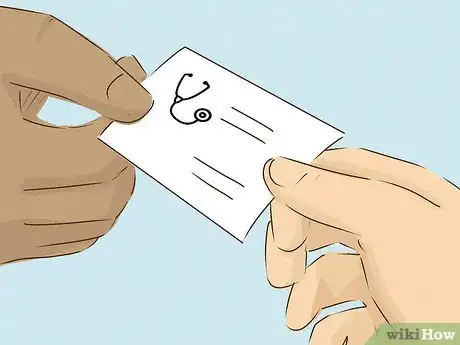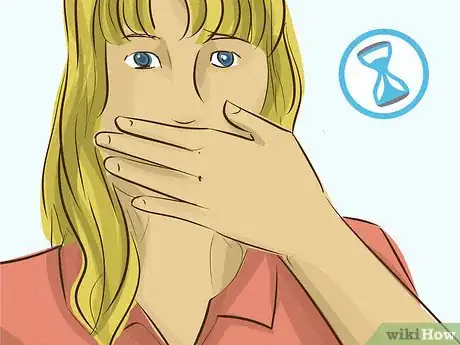This article was co-authored by Maya Diamond, MA. Maya Diamond is a Dating and Relationship Coach in Berkeley, CA. She has 13 years of experience helping singles stuck in frustrating dating patterns find internal security, heal their past, and create healthy, loving, and lasting partnerships. She received her Master's in Somatic Psychology from the California Institute of Integral Studies in 2009.
wikiHow marks an article as reader-approved once it receives enough positive feedback. This article has 18 testimonials from our readers, earning it our reader-approved status.
This article has been viewed 928,589 times.
Do you know someone who can't seem to utter the truth? Some people lie to make themselves look good or to get what they want, and others because they actually believe what they're saying. Either way, confronting the liar is a good place to start dealing with their bad behavior. It's important to remember that you don't have the power to change someone else - in the end, all you can do is tell the truth yourself. Read on to learn more about how to deal with a liar.
Steps
Assessing the Problem
-
1Recognize when the person is lying. If you know what to look for, it's not hard to tell when someone is lying to you. Knowing how to recognize when the person is trying to deceive you can clue you in to how serious the issue is. Get to know how the person looks and acts in a normal, non-stressful situation, and contrast this with how they act when you think they may be lying. After a while you should be able to read the person's body language well enough to have a grasp on when they're not telling the truth.[1]
- Check out the way the person acts when you ask their birth date or hometown. Now compare that behavior to how the person acts when you ask a more difficult question, like whether they slept with your boyfriend or fudged numbers on a work document. If the person is telling the truth, they shouldn't show signs of stress when answering the more difficult questions.
- Forget what you've heard about lack of eye contact being an indication that someone is lying; in fact, many liars deliberately make eye contact because of this myth.
- When people lie they unconsciously exhibit other physical signs of stress. Look for these signs:
- A fake smile that engages only the mouth, not the eyes.
- A higher-pitched voice than normal.
- Dilated pupils.
- Very slow blink rate (and rapid blink rate when the lie is over).
- Antsy foot movements, like toe-tapping or shuffling.
- Face touching, like repeatedly covering the mouth, eyes or nose.
-
2Look for patterns in the person's lies. Many people lie about a few subjects that make them extremely uncomfortable - usually their past bad behavior or something that makes them embarrassed. If the person in question tends to consistently lie when asked about a certain topic, you may just want to back off and stop pressing that particular issue. However, if the person's lies seem to have no rhyme or reason, with no pattern you can make out, you've got a bigger problem on your hands.[2]
- If someone lies every time you ask them about why their father is always absent, or why they never finished high school, or why they refuse to speak to a certain person, the answers to those questions might well be classified as none of your business, anyway. Unless you're in a committed relationship with someone, you aren't entitled to knowing every detail about someone's life.
- If, on the other, hand the person seems to tell lies just for the heck of it, even when asked questions about seemingly unimportant topics, they might be a compulsive liar. Since their lying doesn't follow a pattern, it will be a lot harder to sympathize with the person's intentions for hiding the truth.
Advertisement -
3Determine whether the person's lies are harmful. It never feels good to be told a lie, but some lies are more harmful than others. Before you stage an intervention, figure out how the lies are affecting the liar, you, and other people who may be involved.[3]
- Is the person merely protecting themselves from saying too much? Maybe it's not that big a deal.
- Is the person lying to manipulate other people? Do people make decisions based on what the person says, not realizing they've been lied to? This is a problem that needs to be addressed.
- Is the person lying to get away with bad behavior, like stealing, cheating or hurting someone? This behavior has a severely negative effect.
-
4See if the person gets pleasure from lying. Some people actually enjoy the act of lying more than they enjoy telling the truth. It can be like an addiction, evoking a small high each time a lie is told. Brazen liars who have gotten away with lying for a long time might start to lie as a way of life, rather than out of perceived necessity. Compulsive liars are tough to crack, since they need to treat lying like any other addiction.[4]
-
5Look for signs the person is a pathological liar. Pathological liars tell exaggerated lies that are so far from the truth that they're often glaringly obvious. They often believe the lies they tell, and they'll tell you a completely absurd story with a poker face so earnest that you can't help but take it as truth. Pathological liars have a psychological disorder. Unfortunately, because they think they're telling the truth, you won't be able to talk them out of lying. Still, it's worth confronting them to determine whether a wake-up call will set them on the path to getting help.[5]
Confronting the Liar
-
1Document instances of lying. Write down each instance of lying that you notice, with details that explain why you believe it's a lie. Do some research so you have evidence that the person was lying, rather than just going on a hunch you have. You want to be able to show the liar that you know without a doubt that they were being deceitful.
- If you can collect hard evidence, such as emails or paperwork that contradicts what the person said, it'll make the confrontation that much easier.
- If you're relying on other people to call out the lie, try to get more than one person's word.
-
2Talk to the person privately. Confronting someone on their bad behavior in public is pretty cold, and isn't likely to help that person change. It's better to discuss the matter in private, so feelings of shame and embarrassment don't escalate the matter to a breaking point. Calmly tell the person that you believe they lied. Spell out the specific lie or lies you want to discuss.
- Don't call the person a liar. Again, it's better to take a gentle course at first. In most cases the person will be so embarrassed at being found out that they will stop lying.
-
3Give the liar a chance to explain the lie. Watch the person's body language carefully for more signs that they are lying. Listen to the person's excuse. If they admit to the lie and apologize, you may not need to take the confrontation much further. Discuss the matter fully and end the conversation by telling the person that you hope it doesn't happen again.
-
4Show your evidence that a lie was told. If the person gets defensive, makes excuses, or continues lying during the confrontation, it's time to bring out the evidence. Show the person the emails, papers, or other evidence you collected that definitely proves they lied to you. At this point you've cornered the liar, and they will probably either remain silent or begin to apologize.
-
5Explain that your trust has been lost. This is a difficult thing to hear, and the person in question will probably feel upset when you tell them that you no longer believe a word they say. Explain that you can't help but be hyperaware that the person might lie, and that until they demonstrate a commitment to the truth over a prolonged period of time, your trust will still be broken.
- Most people will be deeply embarrassed by this, and hopefully will make a commitment to you to tell the truth from now on.
- Compulsive liars may admit that they have an addiction, and ask you for help in stopping their bad habit. You may have to confront them over and over again before they stop lying for good; for some, it will be a never-ending battle.
- Pathological liars and sociopaths are not going to be swayed by a confrontation. For them, lying is an essential part of their personality.
-
6Recommend psychological treatment if necessary. Tell the person that excessive or compulsive lying is something that can be treated in therapy. Encourage the person to seek outside help before they lose everyone's trust. Eventually, liars are usually exposed - and as a consequence, they can lose their jobs, ruin relationships, and hurt their chances for living a more honest lifestyle.
Dealing with the Aftermath
-
1Understand it might take awhile for the liar to stop. People who have made a habit of lying can't usually break it right away. Don't be surprised if you catch the person in a lie again at some point in the future. Depending on your relationship to the liar, you may or may not want to continue helping them stop by repeating the cycle of gathering evidence, confronting the liar, and informing them that trust has been broken.[6]
-
2Know you don't have the power to change another's behavior. Ultimately, you can't know what's going on in someone else's head. If a person wants to stop lying, they will have to make that commitment and stick to it. If a person doesn't want to stop, there's absolutely nothing you can do about that.
-
3Protect yourself from being harmed by the liar. Dealing with a liar can be emotionally exhausting. Just when you think trust has been restored, you might catch the person in the act again, and be forced to start all over. It's important to take time away from the person and spend time with people you know you can trust. You might also consider seeking counseling for help dealing with the mixed emotions that come with being close to a liar.
- Don't get wrapped up in the person's lies. Make sure you always have a firm grasp on the truth. Good liars are believable, and it's important to be able to tell the truth from fantasy.
- Cut the person off if it gets out of hand. Don't let yourself get too sucked in. At a certain point, you might need to cut ties and let go of a toxic relationship. After you've done everything you can, break it off and start healing.
Expert Q&A
-
QuestionHow do you respond to a lying partner?
 Maya Diamond, MAMaya Diamond is a Dating and Relationship Coach in Berkeley, CA. She has 13 years of experience helping singles stuck in frustrating dating patterns find internal security, heal their past, and create healthy, loving, and lasting partnerships. She received her Master's in Somatic Psychology from the California Institute of Integral Studies in 2009.
Maya Diamond, MAMaya Diamond is a Dating and Relationship Coach in Berkeley, CA. She has 13 years of experience helping singles stuck in frustrating dating patterns find internal security, heal their past, and create healthy, loving, and lasting partnerships. She received her Master's in Somatic Psychology from the California Institute of Integral Studies in 2009.
Relationship Coach If you catch your partner in a lie, let them know what you observed, then share how you feel about it and make a request for how you'd like them to handle the situation in the future. If it's a really big lie, though, it might be beneficial to go to couples therapy so you can work through the betrayal or distrust and heal that wound in the relationship.
If you catch your partner in a lie, let them know what you observed, then share how you feel about it and make a request for how you'd like them to handle the situation in the future. If it's a really big lie, though, it might be beneficial to go to couples therapy so you can work through the betrayal or distrust and heal that wound in the relationship. -
QuestionMy boyfriend constantly lied about me to my parents, my siblings and, my neighbors. I still have feelings for him, but the lies are emotionally exhausting. What should I do?
 Community AnswerYou need to get him completely out of your life. His behavior is toxic to you and you don't need that. It will hurt, but you have to do it for your own good.
Community AnswerYou need to get him completely out of your life. His behavior is toxic to you and you don't need that. It will hurt, but you have to do it for your own good. -
QuestionWhat should I do if my boyfriend lies to me so he can spend time with other people and on social media?
 Community AnswerYou should talk to him about it, explain how he's making you feel, and tell him that you need to be honest with each other. If he doesn't change his behavior, break up with him. It doesn't sound like he cares about you very much, and it's not worth being with someone like that.
Community AnswerYou should talk to him about it, explain how he's making you feel, and tell him that you need to be honest with each other. If he doesn't change his behavior, break up with him. It doesn't sound like he cares about you very much, and it's not worth being with someone like that.
Warnings
- Anger and harsh words only lead to more hate, and prove the other person's lies and harsh words correct about you. Don't be manipulated into making yourself look like a mean person as this is a huge payoff (desired outcome) for a liar who back stabs and undermines others.⧼thumbs_response⧽
- Don't make any life or basic choices based on what the liar is telling you.⧼thumbs_response⧽
References
- ↑ https://www.verywellmind.com/how-to-tell-if-someone-is-lying-2795917
- ↑ https://www.apa.org/monitor/julaug04/detecting
- ↑ https://www.psychologytoday.com/us/blog/lifetime-connections/201804/is-it-ever-okay-tell-lie
- ↑ https://www.psychiatrictimes.com/addiction/pathological-lying-symptom-or-disease
- ↑ https://blogs.psychcentral.com/caregivers/2014/09/6-subtle-characteristics-of-the-pathological-liar/
- ↑ https://www.psychologytoday.com/us/blog/compassion-matters/201309/why-we-lie-and-how-stop
About This Article
To deal with a liar, document instances where you catch them lying, and any evidence that proves it. Then, talk to them privately, calmly bringing up the specific lies you want to discuss and giving them a chance to explain. If they admit to lying, thank them for coming clean and end the conversation by telling them you hope it doesn’t happen again. On the other hand, if they get defensive, show them any evidence you’ve collected that contradict their excuses. Finally, explain that if they continue to lie to you, you won’t be able to trust them. To learn how to manage the aftermath of this difficult confrontation, keep reading!












































































